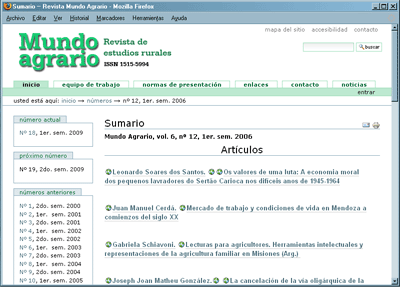Cooperativas, crédito estatal y desarrollo rural. Una primera aproximación a su estudio en el caso de Córdoba (1940- 1960)
Main Article Content
Abstract
In this article its put in a relationship the results of the study over the material incentives of cooperative action with the trends of rural and familiar economy, in Cordoba, between 1940 and 1960. The new mechanisms of colective commercialization, where the second grade entity FACA (Federación Argentina de Cooperativas Argentinas) had a participation and to which were associated the primary cooperatives related to the Federación Agraria Argentina and, to the State -through the Instituto Argentino de Promoción al Intercambio- increasing the negotiation power of rural productors. On the other hand, the provincial credit policies were -from the beginning of the period- favourable to the rural and cooperative sector. Both factors -we propose- acted as material incentives to steightened familiar economy. To analyze the rural economy of familiar productors we worked with censal data in a micro-regional level (departamento Tercero-Arriba) and we contextualized this study with the results of other investigations about the pampeana and cordobesa region and at national level. We also worked about the cooperatives practices with memories, balance and micro-region entities records, and we did a first aproach to the provincial credit policies with the cooperatives, through sources made and existent in Cordoba's Provincial Bank.
Downloads
Download data is not yet available.
Article Details
How to Cite
Olivera, G. (2006). Cooperativas, crédito estatal y desarrollo rural. Una primera aproximación a su estudio en el caso de Córdoba (1940- 1960). Mundo Agrario, 6(12). Retrieved from https://www.mundoagrario.unlp.edu.ar/article/view/v06n12a09
Issue
Section
Dossier: Economía social e intervención estatal en la Argentina del siglo XX
Works are released under a Creative Commons License (Creative Commons 4.0. Atribución-NoComercial-CompartirIgual) which provides unrestricted use, copy and redistribution in any medium or format and remix, transform and build upon the original work properly cited. The Creative Commons License stipulates that: "You must attribute the work in the manner specified by the author or licensor (but not in any way that suggests that they endorse you or your use of the work)."
